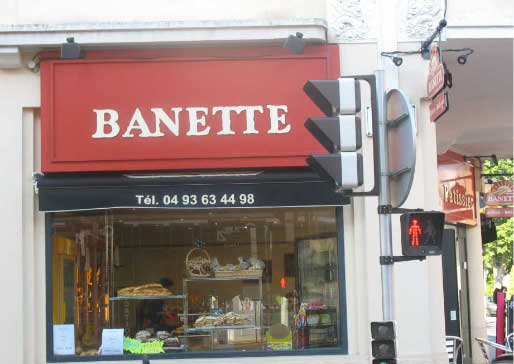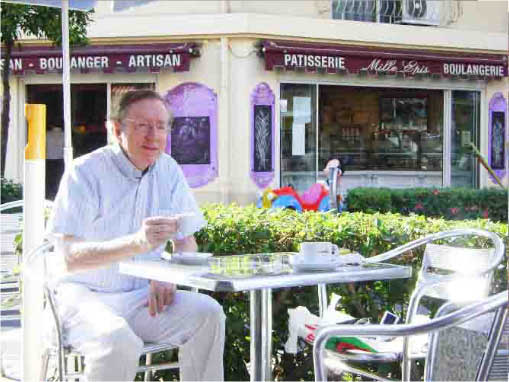Lessons on high-performance from a village in France
The actor, even though his occupation involves the monotonous and long continued repetition of the most trifling details, never fails to get a thrill of pleasure from the breathless silence or stirring applause of the audience. Were he compelled to go through his part as often and as rigorously under the cold supervision of an indifferent supervisor, and under that only, how flat and stale it would become!
F.W.Taussig: Principles of Economics 1911
It is seven-thirty in the morning in a little village in the south of France. The village is Golfe-Juan. We are just a few kilometers from the big modern city of Cannes. But the scene I am looking at is as different from a big city as it is possible to be.
On this pleasantly crisp June morning, the sky is blue. I am sitting at an outdoor table of a cafe called
La Fregate, sipping an espresso coffee.
The irresistible aroma of freshly baked bread
As I sit, the rich irresistible smell of warm fresh bread is wafting across the one-lane street from the the
boulangerie called
Mille Epis (literally, “thousand ears of corn”) and tantalizing my nostrils. The bread is baked on the premises by people who are masters of their craft. Even at this hour, clients are coming to pick up their freshly baked baguettes. They usually buy two. It is no use buying one baguette. The bread is so tasty and aromatic you will have eaten one on the way home.

I spend several months a year in France and the rest of the year in the U.S. Each time I am away from France, I begin to think: maybe I was mistaken? Maybe I have exaggerated? Maybe I am romanticizing the quality of the baguettes? After all, French bread is French bread, purchasable n countries outside France, no? Then I arrive in Golfe-Juan and I bite into a loaf of freshly baked baguettes, and all doubts vanish. There is no need to die. I am already in heaven.
Does
Mille Epis make the best bread in Golfe-Juan? The debate is endless among the residents
of Golfe-Juan. Despite its tiny size, Golfe-Juan boasts three boulangeries in the very center of the
village, along with several others just a few hundred yards away.
Mille Epis has its vocal supporters.
For other residents, there is no equal to
Banette.

A neighbor casts his vote for
the
Artisan Boulangerie, although even he concedes that his judgment could be clouded
by the seductive charms of the baker’s doe-eyed daughter. Who is right? Who knows? By
any international standard, all these boulangeries are making bread and pastries of incredibly high quality.

The butchers and the fishmongers
Just a few steps away, in the two
boucheries, the butchers are preparing beef steaks and lamb chops
as carefully as pieces of jewellery.
Also, just around the corner, in three fish shops or poissoneries of Golfe-Juan, where the fish are laid
out as carefully silk designer ties, the fish-monger can tell you when and where each
fish was caught, what its merits are and how to cook it. If you have the time and the inclination,
she will also deploy her talents as a part-time philosopher and help you solve any personal problem you might be having.

The scene is somewhat reminiscent of a 1950s movie set. As I sit in the cafe, sipping my espresso, I would not be surprised to see Maurice Chevalier strolling merrily down the narrow street , with a baguette and a copy of the local newspaper, Nice-Matin, under his arm, gaily tipping his hat to the people he met.
By some idiosyncratic miracle, Golfe-Juan has been spared the ravages of commercial development. Everything is on a small scale. The village has only one and a half short streets.
It is not that everyone knows everyone else in Golfe-Juan: there are quite a few summer visitors like our family. But the people in business here know who their clients are. They have direct and immediate contact with them on a daily basis. The clients care deeply about what they are doing. The people doing the work know in the most direct way on a daily basis whether they are delighting them.
Once upon a time, all work was like this. All work was local. The people for which work was being performed were people in the local area. The people doing the work could immediately see the results of their work and understand how what they did related to the people they were doing it for. It wasn’t that everyone was necessarily happy. But everyone knew the meaning of their work.
With the growth of giant corporations and the atomization and specialization of work, that clear line of sight from the people doing the work to the people for whom they were ultimately doing it was broken.
Making things vs delighting people
There is a big difference between work that is seen making things for unknown buyers and work seen as delighting people.
When we look at the work merely as making things, we can begin to think—mistakenly—that the purpose of work is to please the boss or to earn a salary or advance up the salary ladder.
This way of thinking and acting is deadening. It’s dispiriting. It’s soul-destroying. And it’s pervasive in the modern workplace.
In Golfe-Juan, where the business people in the boulangeries, or boucheries, or poissoneries, are face-to-face with their ultimate clients on a daily basis, they are not likely to be deluded into thinking that the purpose of work is to produce things or to please the boss or advance up some salary ladder. These are people who do what they are doing because they love doing it and because it also delights their clients.
Whether they know it or not, the boulangers, bouchers and poissoniers in Golfe-Juan embody a principle that is steadily gaining currency in the 21th Century:
The purpose of work is to delight a client.
When that simple but revolutionary principle is kept in continuously and rigorously in mind, many of the problems of the workplace disappear and the possibilities of a different kind of work—more productive and more satisfying— become possible.
When that principle is ignored, all sorts of workplace problems become insoluble. When that principle is systematically ignored, you end up with our current situation of only one of five people being fully engaged in their work.
Obviously the scale of the modern enterprise and geographical distance between the people doing the work and the people for whom the work is ultimately being done, and the scale of activity can make it harder to establish a clear line of sight between those two groups of people. Harder, but usually not impossible, particularly now that communications from one side of the planet to another is so easy and cheap. Once we start out with this fundamental principle in mind, the challenge of management becomes one of creating that clear line of sight to the extent possible.
The principle applies whether you are building a mammoth construction project or running the work of a firm or planning something as simple as your daughter’s birthday party.
The task of management is to organize work in such a way that those doing the work have a clear line of sight to the client they are intending to delight and can know on an ongoing basis whether that goal is being achieved.
"Delight"
The word “delight” is especially meaningful, as opposed to “serving people” or “satisfying customers”
or “delivering products” or some other even more deadly business term. It implies generating a
level of enthusiasm and positive emotion that will spread from one person to another. Once you’ve
delighted someone, you have created a relationship, and once you’re in a relationship, then everything
becomes much easier. Because people are delighted they want the relationship to continue. Getting paid
isn’t the goal of the relationship, but once you have this delighted relationship, money changes hands,
almost as an obvious by-product, as an incidental part of the relationship. Moreoever delighted people
become information radiators to other people, so that the challenge of expanding your brand becomes very
much easier.
The new localism
A number of books have been written about the spreading dissatisfaction with the modern workplace and
solving it by reverting to a purely local economy.
In 1998, Richard Sennett published
The Corrosion of Character: The Personal Consequences of Work in
the New Capitalism and wrote about the soul-destroying consequences of the modern workplace—endless hours spent on abstract tasks on computer screens.
In 2008, in
The Crattsman, he suggested that skilled labor was a possible solution to the horrors of corporate mediocrity.
In
Deep Economy (2009) Bill McKibben preached the value of localism and urged readers to live smaller and simpler lives, not unlike what I see at 6.30 am in my coffee shop in Golfe-Juan.
Similarly in
In Defense of Food (2009), Michael Pollan paid tribute to small farms and local tribute.

In
Shop Class as Soulcraft: An Inquiry into the Value of Work (Penguin 2009) Matthew Crawford urges “a return to real work”, by which he meant a return to tangible activities like repairing motor-cycles. For Crawford, the solution to big business is small business. He urges the scrappy spirit of small business against “the softly despotic tendencies” of “outsized corporations”.
The problem with the new localism
These calls are attractively romantic but sadly unrealistic. They imply not just stopping the clock, but turning it back a few hundred years. The idea that we could solve the woes of the modern economy by abandoning globalization and returning to a world of local economies is frankly somewhat nutty. There is no way that a set of local economies could possibly generate the prodigious array and attractive prices of the products and services that the global economy generates, and the 21st century consumer demands. Localism is only possible today because it piggybacks on the global economy.
The
boulanger, or the
boucher, or the
poissoniere in Golfe-Juan can spend their days delighting clients by making gourmet bread or selling jeweled beef or the freshest fish, and then stroll down to supermarket and buy an iPod, or a computer or a flat screen TV or whatever they want from around the world at very reasonable prices. They have the best of both worlds.
So globalism and big corporations are here to stay, at least for the foreseeable future.
As a general economic theory, the new localism may be somewhat nutty, but there is nevertheless a grain of truth in it. That is the importance of a clear line of sight from those doing the work and those for whom the work is intended, and the possibility of focusing on delighting those people as a way of relieving the threat to human posed by boring meaningless labor.
A clear line of sight to the clients you aim to delight
This is what the shopkeepers in Golfe-Juan, Sennett’s craftsmen, Pollan’s local farms and
Crawford’s motor-cycle repairman all have in common. They know precisely who their clients,
and can, if they so choose, focus their attentions on delighting them and ascertain almost
immediately whether they are succeeding.
As noted in the Taussig quote at the start of this post, an
actor's work is not inherently very interesting: it's the presence of an audience, and the direct feedback
that the actor gets from the audience
that make it interesting. Similarly, it’s not that the work of these local bakers, butchers and
fishmongers is inherently more interesting
than work in a large corporation: the difference is that it has more meaning. It has a point.
People can understand the story in which they are involved and they can see immediately the
results of their labors in terms of whether their clients are delighted or not.
The fact that, when this clear line of sight to clients is established, clients are more likely to be
delighted, that businesses are more likely to be
profitable and workers more likely to be fulfilled in their work. It's a triple win for all involved.
Creating this clear line of sight is relatively easy when the business is local. When the business
is huge and global and the market is vast with tens of millions of customers, is it possible to
set up the same line of sight between workers and their clients?
I believe that it is and a number of firms have pulled off the trick. I’ll be discussing how in subsequent posts on this site. Meanwhile I’ll go on sipping my espresso coffee and thinking of the wonderful fresh-baked baguette that I’m about gorge myself on.
